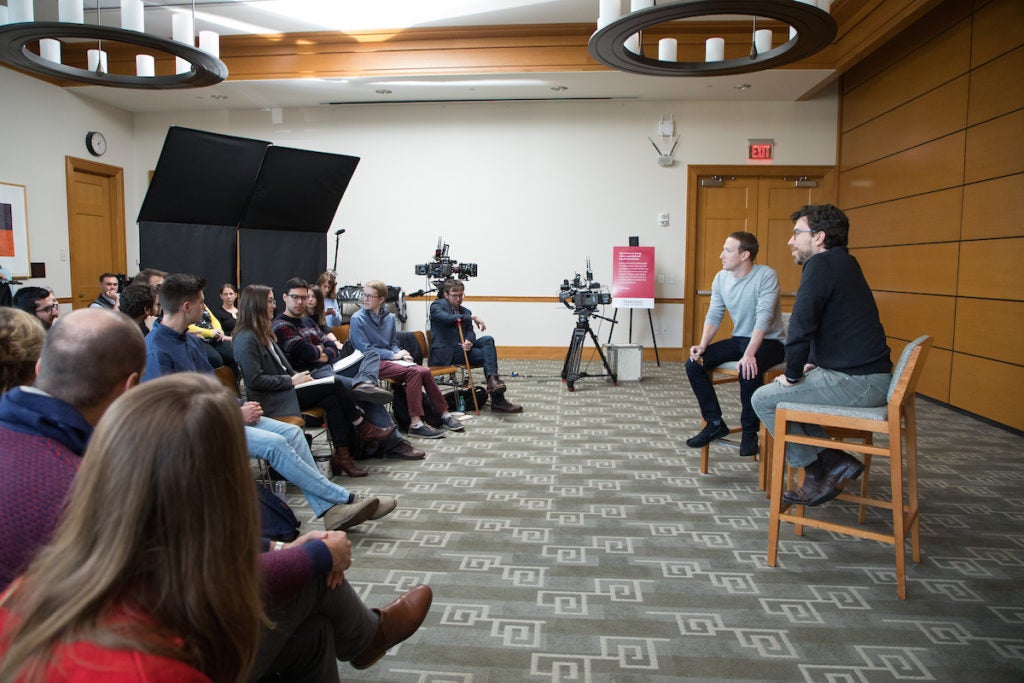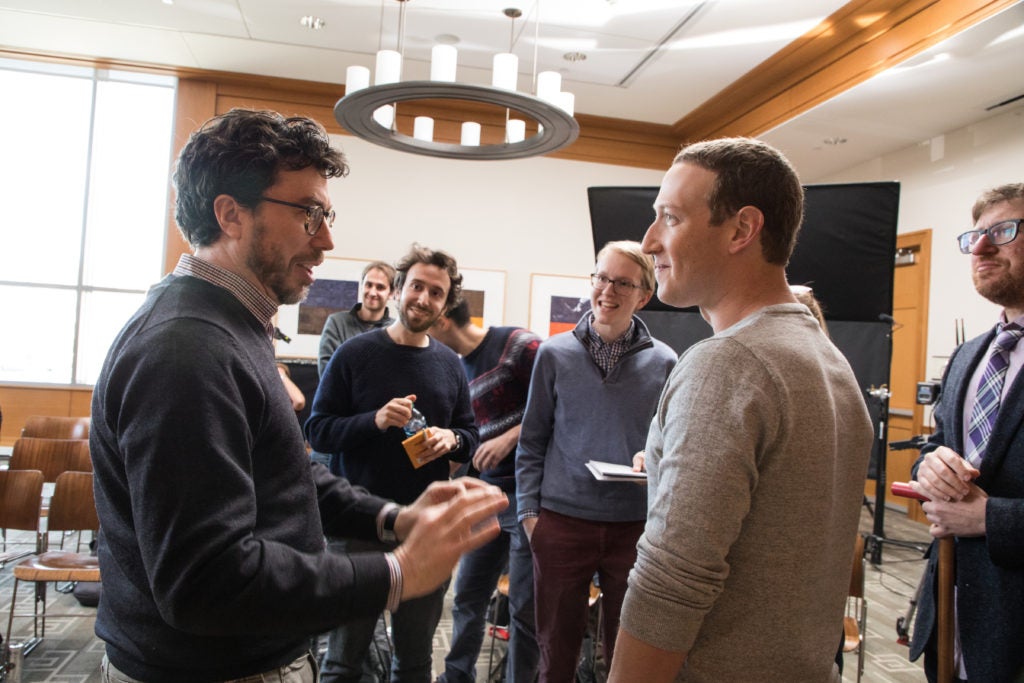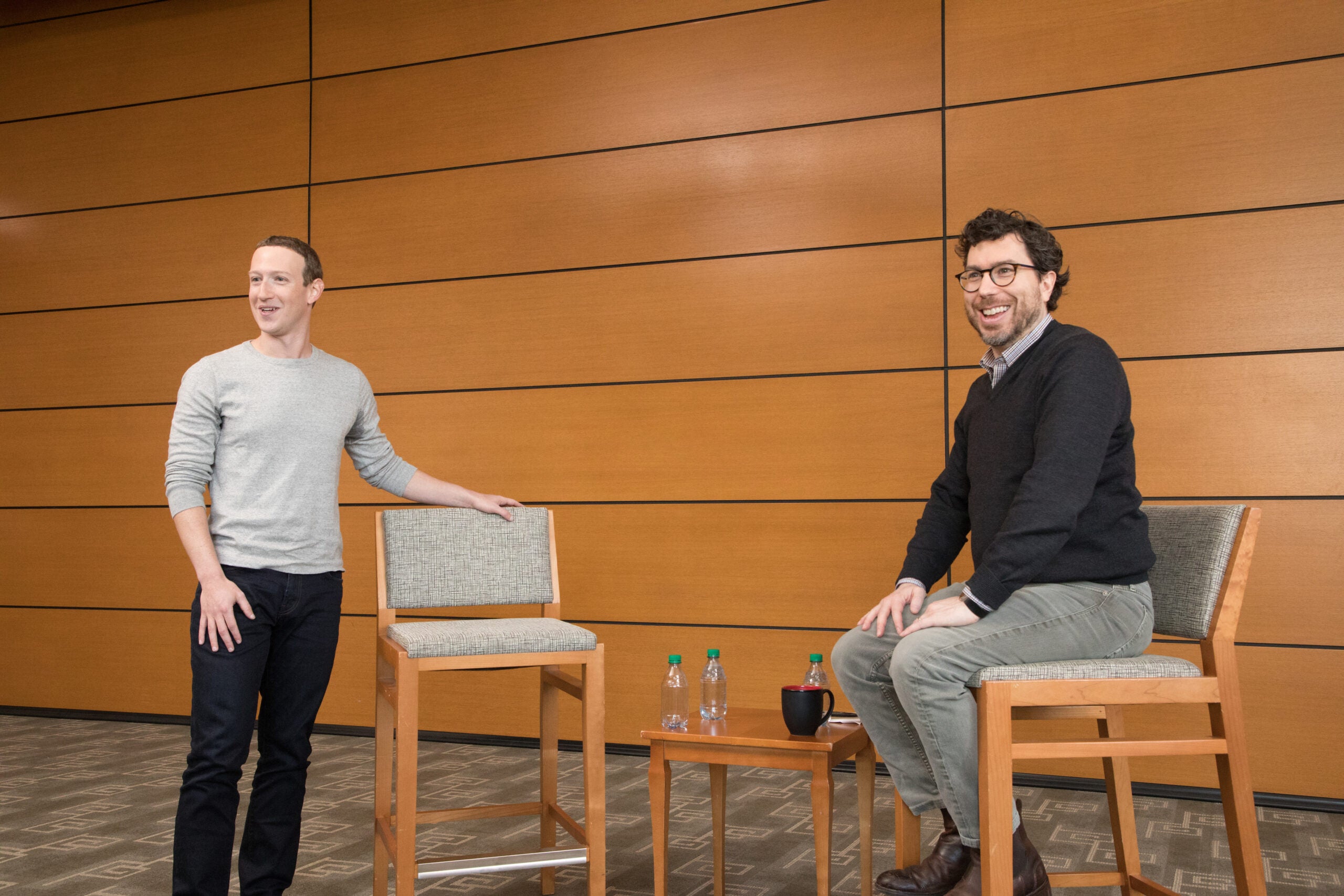Should Facebook be considered an “information fiduciary” when it comes to the privacy of its clients? How should we weigh the pros and cons of encryption schemes which might bolster privacy and data security at the risk of shutting out law enforcement? And why shouldn’t Facebook tell users how much advertising revenue their respective data generates on a daily basis? Those were some of the questions Facebook Co-founder and CEO Mark Zuckerberg discussed with Jonathan Zittrain ’95, HLS’s George Bemis Professor of International Law, in a conversation among students at Harvard Law School on Feb. 11.
The nearly two-hour discussion was part of a series of study sessions for Harvard’s Techtopia initiative, a program for students across the University to explore problems in technology and governance, and it included participants from Zittrain’s course on Internet & Society: The Technologies and Politics of Control.
Zittrain launched the conversation at HLS by raising the question of whether Facebook and other data-hungry internet companies should become “information fiduciaries.” Developed with Yale Law Professor Jack Balkin, the concept involves making such companies abide by a duty of loyalty to their users when handling sensitive data–including putting the user’s interests in front of profits–much the same way a lawyer or doctor must protect a client’s confidentiality.
“The idea of us having a fiduciary relationship with the people who use our services is intuitive,” said Zuckerberg. “[Facebook’s] own self-image of ourselves and what we’re doing is that we’re acting as fiduciaries and trying to build services for people. … Where this gets interesting is who gets to decide in the legal sense, or in the policy sense, of what’s in people’s best interest.”

The conversation segued into another topic area involving competing sets of interests: the use of end-to-end message encryption to make private communications inaccessible to eavesdroppers. End-to-end encryption has come under criticism for making it difficult in some cases for law enforcement agents (with the proper warrants) to access evidence locked up on devices. Zittrain raised the possibility that governments not embracing the rule of law might use their legal and technical capabilities to peek into unencrypted private communications at will. “The modern surveillance states of note in the world have a lot of arrows in their quivers… they’ve got a plan B, a plan C, and a plan D,” he said.
Zuckerberg said he is inclined to implement more end-to-end encryption. “I basically think that if you want to talk in metaphors, messaging is like people’s living room, and we definitely don’t want a society where there’s a camera in everyone’s living room,” he said.
Zittrain pointed out that people are happily installing Facebook’s own smart camera–the Portal–in their living rooms. Zuckerberg laughed. “That is I guess… yeah. Though that would be encrypted.”
When the conversation turned towards advertising, Zuckerberg’s take was less in alignment with Zittrain’s. “I imagine it might be possible,” Zittrain ventured, “to issue me a score of how much I’ve earned for Facebook this year. It could simply say ‘this is how much we collected on the basis of you in particular being exposed to an ad…’” Zittrain expanded that such a number might provide the basis for an informed conversation about an ad-free Facebook subscription model.
Zuckerberg argued that offering users different monetization models would mean offering them different data-handling models. “Are we going to let people pay to have different controls on data use than other people? And my answer to that is a hard no.” He described a forthcoming tool called “Clear History” which would allow users to clear some of the data that Facebook accumulates about them for ad targeting purposes.
Zittrain pointed out that “there’s a little paradox lingering in there. [Control over data] is something so important and vital that we wouldn’t want to deprive anybody of access to it, but therefore nobody gets it… in other words if I could buy my way out of ads and data collection it wouldn’t be fair to those who can’t, and therefore we all subsist with it until the advances you’re talking about.”
Zittrain, who directs the Harvard Law School Library, proposed an idea for validating content through a virtually convened panel of librarians that could be set up to fact-check content flagged by members of the community similar to the role they play as reference librarians.
“Librarians live for questions like that,” said Zittrain. “They have a notion of patron duty that says, I may disapprove of you even studying this, but I’m here to serve you the user and I just think you should know this is why maybe it’s not a good source.” And, Zittrain added, there could be high school students who apprentice for credit to develop the next generation of fact-checkers.

Zuckerberg raised the company’s proposal for an external review board that could weigh in on content questions and appeals and provide binding decisions on hard issues. “You know we make a lot of decisions around content enforcement and what stays up and what comes down,” he said. “Having gone through this process over the last few years of working on this system, one of the themes that I feel really strongly about is that we shouldn’t be making so many of these decisions ourselves.”
And in something of a break from expectations, Zuckerberg pointed an area where he might want to see Facebook take a step back from its present role in the internet ecosystem–identity management. Zittrain had cautioned in a 2014 interview with Harvard Law Today: “To me, the question is whether Facebook is, at the end, about managing one’s identity online. Every time someone signs on to a website using ‘connect with Facebook,’ that’s interposing Facebook into an otherwise independent relationship.” In the conversation, Zuckerberg concurred with some of the drawbacks of the Facebook Connect model. “For developers, one of the things that is really troubling about working with our system–or with Google’s system for that matter, or having to deliver your services through Apple’s App Store–is that you don’t want to have an intermediary between the people using your service and you.”
“I can’t tell if you’re referring to a recent incident,” probed a smiling Zittrain, making reference to the company’s recent tangle with Apple in which Apple cut Facebook off from some of its own internal corporate iPhone-based apps. “No, I was… well, sure” said the 34-year-old CEO, with a faint hint of a chuckle.
“I’m curious whether you still think that we can ‘fix this mess,’” asked Zuckerberg, quoting from the headline of a New York Times essay Zittrain had written. “‘Hope springs eternal’ is my motto,” Zittrain replied.
